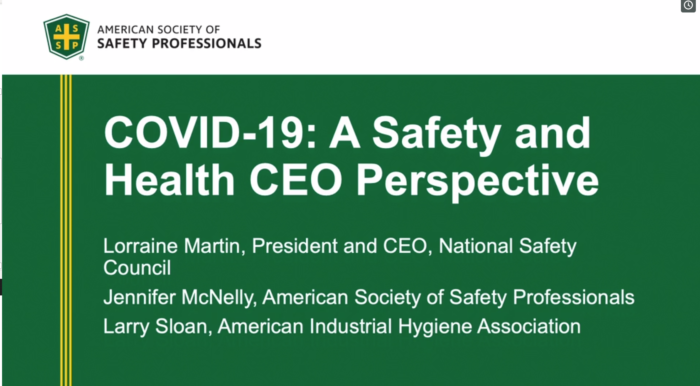Contents
Is COVID-19 Recordable or Reportable to OSHA?
COVID-19: A Safety and Health CEO Perspective
Texas Mutual Pays Individual Dividends to Policyholders Early This Year
Is COVID-19 Recordable or Reportable to OSHA?
Patricia Kagerer IRMI
One question plaguing risk and safety professionals is whether or not an employee with a confirmed case of COVID-19 is Occupational Safety and Health Administration (OSHA) recordable. Like everything about this pandemic, the answer to that seemingly simple question is fluid.
Back in early March 2020, OSHA issued general guidance on COVID-19 for employers. The guidance contained a very general statement about tracking COVID-19 cases and recording them in compliance with OSHA’s record-keeping standards. This one seemingly benign statement sent employers into a flurry of questions. OSHA has recently attempted to provide clarification by posing guidance questions and answers.
COVID-19: Recordable on the OSHA 300 Log
Is an employee confirmed with COVID-19 recordable on the OSHA 300 Log? Work-related injuries or illnesses are recordable under certain circumstances. But it should be noted that not all employers are required to maintain records of work-related injuries and illness. Some employers are exempt based on their North American Industry Classification System (NAICS) codes. Assuming the organization is required to maintain work-related injury and illness records, if there is an employee with a confirmed case of COVID-19 where the work environment was likely the cause or contributing factor of the illness, then the COVID-19 case may be recordable if one of the following occurs.
- Medical treatment (beyond first aid) is provided, such as prescription medication is issued.
- Restricted duty is imposed by the treating physician or the employer.
- Days away from work (lost time) is imposed by the treating physician (the employee is kept from work and cannot work at home due to the virus).
Given what we know about the virus currently, it is more likely that medical treatment or days away (lost time) will occur with COVID-19.
Here is what OSHA has specifically said on the recording of a confirmed COVID-19 case.
COVID-19 can be a recordable illness if a worker is infected as a result of performing their work-related duties. Due to the contagious nature of the virus, it will be very difficult to determine where a person was infected. However, employers are only responsible for recording cases of COVID-19 if all of the following are met.
- The case is a confirmed case of COVID-19 (see Centers for Disease Control and Prevention information on persons under investigation and presumptive positive and laboratory-confirmed cases of COVID-19).
- The case is work-related as defined by 29 CFR 1904.5.
- The case involves one or more of the general recording criteria set forth in 29 CFR 1904.7 (e.g., medical treatment beyond first aid or days away from work).
COVID-19: Reportable to OSHA
Is an employee confirmed with COVID-19 reportable to OSHA? The only way a COVID-19 case would be reportable to OSHA would be if the employee passes away or is hospitalized as an inpatient (outpatient hospitalizations are not reportable to OSHA) as a result of COVID-19 contracted from performing work-related duties. The normal criteria for reporting severe injuries applies even to COVID-19 cases. Employers must report any worker fatality within 8 hours of the incident. They must also report any amputation, loss of an eye, or hospitalization of a worker within 24 hours. Exempt employers must report a severe injury if it meets this criterion as well.
COVID-19: Compensable under Workers Compensation/OSHA Recordable
If the case is covered and deemed compensable under workers compensation, is it OSHA recordable? OSHA recordable and compensability under a workers compensation claim are two separate issues and have no bearing on each other. If an employee files a claim for workers compensation for a COVID-19-related illness, it should have no bearing whatsoever on whether it is deemed OSHA recordable by the employer.
OSHA Enforcement
In areas where there is ongoing community transmission, employers other than those in the healthcare industry, emergency response organizations (e.g., emergency medical, firefighting, and law enforcement services), and correctional institutions may have difficulty making determinations about whether workers who contracted COVID-19 did so due to exposures at work. Until further notice, according to the directive by Deputy Assistant Secretary Amanda Edens, OSHA will not enforce its record-keeping requirements to require these employers to make work-related determinations for COVID-19 cases, except where the following occurs.
- There is objective evidence that a COVID-19 case may be work-related.
- The evidence was reasonably available to the employer. Employers of workers in the healthcare industry, emergency response organizations, and correctional institutions must continue to make work-relatedness determinations pursuant to 29 CFR Part 1904.
OSHA’s enforcement policy will provide certainty to the regulated community and help employers focus their response efforts on implementing good hygiene practices in their workplaces and otherwise mitigating COVID-19’s effects.
OSHA recently issued 10 best practices for employees to follow to prevent the spread of COVID-19. This document should be displayed at all workplaces and reviewed with all employees.
HOTCOMP will miss Safety Committee Member Linda Razor. After 40 years of dedication and service Linda Rasor, retired.
As the CEO of Castro County Hospital, Linda was instrumental in helping HOTCOMP succeed. She has continued to bring fresh ideas to help our hospitals become safer work places.
As Linda starts her new journey, we want to be sure she knows her service has been appreciated. We wish her the best of luck on her new adventures.
COVID-19: A Safety and Health CEO Perspective
American Society of Safety Professionals
Texas Mutual Pays Individual Dividends to Policyholders Early This Year
Texas Mutual is proud to announce that $330 million in dividends are being distributed early this year to over 57,000 Texas businesses! The board voted to pay this dividend two months ahead of schedule to support our policyholders during this critical time.
Safety group dividends will be paid later this year.
Safety Training at Texas Mutual
Building a safer workplace is your number one way to control workers’ compensation costs. Explore resources exclusively available to you as a Texas Mutual policyholder.
Online tools and e-Learning
- Safety webinars
- Safety courses
- Online OSHA training
- Texas Mutual events
Click Here to check it out.
Your Safety Committee
The HOTCOMP Safety Committee meets twice a year to discuss the issues of safety in our member hospitals and what we can do to do to help make them safer workplaces.The majority of the Committee members are administrators and safety specialists in your fellow member hospitals. We understand that issues come up through the year. If you would like to post a question to the safety committee members as a group or individuals, please email us at safety@hotcomp.net. We will pass your questions on to the appropriate member(s).
| Barry Couch Board Member, Program Administrator, Safety Committee Member | Brian Roland CEO Stephens Memorial Hospital Safety Committee Member | Gayle Cannon Director of HR Childress Regional Medical Center Safety Committee Member |
| Fay Bennett VP of Employee Services Guadalupe Regional Medical Center Safety Committee Member | Bill Hamlyn Nursing AVP Oakbend Medical Center Safety Committee Member | Gerardo Garcia Chief Quality Officer Childress Regional Medical Center Safety Committee Member |
| Alexander Trudeau Senior Agency Operations Specialist Texas Mutual Insurance Company Advisor, Safety Committee Member | Carol Villareal HR Manager Gonzales Healthcare System Safety Committee Member | Jill Smith Sr. Director of Human Resources Titus Regional Medical Center Safety Committee Member |
| Stacy Rose Manager of Safety Services Texas Mutual Insurance Company Advisor, Safety Committee |
About Safety Matters:
It is our hope that this publication, in addition to Texas Mutual’s Safety Resource Center, proves a useful tool to promote safety in our members’ hospitals. The newsletter will focus on safety issues that specifically trend to our membership hospitals.
We hope to hear from you on safety issues your hospital is facing and on successful safety procedures you have implemented. It is the safety committee’s goal to create a collaborative exchange of ideas that contributes to making all of our hospitals safer which, in turn, will increase our safety group’s benefits.
Please send your ideas, questions and comments to safety@hotcomp.net.
Why Your Safety Matters:
You’re receiving this email as a member of the HOTComp safety group. The group is a joint effort between HealthSure and Texas Mutual Insurance Company.
Group members receive exclusive benefits like targeted safety resources, a discount on their workers’ compensation insurance and potential dividends based upon the safe performance of the group. HOTComp group participants have shared in over $3 million in group dividends since 2008 in addition to individual dividends from Texas Mutual.



